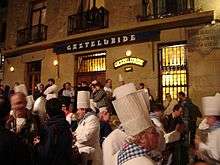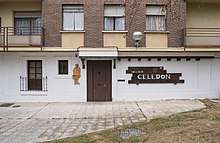Txoko
A Txoko (Basque pronunciation: [ˈtʃoko]) is a typically Basque type of closed gastronomical society where people come together to cook, experiment with new ways of cooking, eat and socialize. The most traditional ones are only open to male members. They are very popular institutions; the town of Gernika, Spain, for example, has approximately 15,000 inhabitants and nine txokos with some 700 members in total.[1]

Name
Txoko, a diminutive form of zoko,[2] literally means nook, cosy corner in Basque. In some regions, the variant xoko is used. In Spanish, they are called sociedades gastronómicas, in French sociétés gastronomiques.[3][4][5][6][7][8][9][10]
History
The first record of a txoko goes back to 1870 in San Sebastián, Spain, from where they spread outwards geographically in all directions.[11][12] They are a modern development of originally informal groups of friends who would regularly meet to eat, drink, sing, and talk.[1][13][14][15]
During the Franco years, txokos became increasingly popular as they were one of the few places where Basques could legally meet without state control, speak Basque and sing Basque songs as the constitution of the txokos prohibited the discussion of politics on the premises.[1]
Setting up a txoko
Normally, a txoko is set up by a group of friends who decide to set up a society. Once enough founding members have been found, they rent a local restaurant or in some cases, buy an appropriate location and equipment. Normally these are premises in a basement with a kitchen or, in more affluent societies, at ground level. They are funded communally from the outset.
Members pay a monthly membership fee which varies from society to society and the exact setup. A treasurer, administrator and buyer are usually nominated who oversee the administration of the txoko. Usually, someone outside the society is hired to deal with the cleaning.
Each txoko has a society constitution that sets out things like the maximum number of members, administration issues and so on.[20] Curiously, most traditional txokos have a clause in their constitution that prohibits the discussion of politics on the premises.[1] Some very conservative txokos have clauses that do not permit women access to the txoko at all[1] such as the Sociedad Gaztelubide in San Sebastián which goes back to 1933. However, most txokos today allow women access to enter the txoko to eat, drink and socialize, but not to cook.
Because the number of members is fixed, there are usually long waiting lists, and vacancies in existing txokos become available only sporadically.
Running a txoko
Since a txoko typically can have up to 80 members but space for less than that, usually not all members use the txoko at the same time. Someone will normally arrange for a smaller group of friends to get together to cook dinner for themselves, their families or guests.[1]
Such a group then "books" the txoko, buys, collects, harvests, hunts, or fishes for fresh ingredients and gets together to prepare the meal. Each member has free access to the txoko's communal stocks. Every individual is responsible to record items such as food and drink that have been used from the communal stocks for themselves or their personal guests and pay for them. This system is fully self-regulated.[1]
A few times a year, all txoko members are invited to get together which occasionally leads to space problems, but it is rare for all members of a txoko to meet at the same time. The ratio between txoko members and guests can vary greatly. At the very least, one txoko member must be present at a dinner but since members are free to invite as many guests as they wish, they may on occasion be the only member present if they are holding a dinner for their football club, extended family, a business dinner, etc.[1]
Impact on Basque cuisine
The development of txokos has had a significant impact on Basque cuisine. Many traditional dishes have been rescued or resurrected by txokos which would have otherwise died out. They have also influenced the development of new dishes as txoko members frequently experiment with new dishes, ingredients and methods, or variations of existing dishes. They are also places where information on the best and cheapest ingredients available is exchanged. This in turn has led to Basque cuisine being both highly refined and affordable.[1]
Txokos outside the Basque Country
In the recent years, txokos have started to appear outside the Basque County or even Spain, including one in the Slovenian town of Medvode.[21]
References
- Plaza, Joseba Txoko in Wandler, R. (ed) Euskadi Walter Frey 1999 ISBN 9783925867385
- Trask, Larry The History of Basque Routledge 1997
- Planet, Lonely; Butler, Stuart; Garwood, Duncan (1 December 2015). "Lonely Planet Pocket Bilbao & San Sebastian". Lonely Planet. Retrieved 18 May 2017 – via Google Books.
- Butler, Stuart (14 April 2016). "The Basque Country and Navarre: France. Spain". Bradt Travel Guides. Retrieved 18 May 2017 – via Google Books.
- Zubiri, Nancy (18 May 2017). "A Travel Guide to Basque America: Families, Feasts, and Festivals". University of Nevada Press. Retrieved 18 May 2017 – via Google Books.
- Iraurgui, Pablo J. Beltrán de Heredia; Autonómico, País Vasco (Spain) Departamento de Presidencia, Justicia y Desarrollo (18 May 2017). "Historia de Euskal Etxea-Hogar Vasco de Madrid". Eusko Jaurlaritzaren Argitalpen Zerbitzu Nagusia = Servicio Central de Publicaciones del Gobierno Vasco. Retrieved 18 May 2017 – via Google Books.
- Jurafsky, Dan (15 September 2014). "The Language of Food: A Linguist Reads the Menu". W. W. Norton & Company. Retrieved 18 May 2017 – via Google Books.
- Vaczi, Mariann (11 February 2015). "Soccer, Culture and Society in Spain: An Ethnography of Basque Fandom". Routledge. Retrieved 18 May 2017 – via Google Books.
- Gatti, Gabriel; Irazuzta, Ignacio; Albeniz, Iñaki Martínez de (18 May 2017). "Basque Society: Structures, Institutions, and Contemporary Life". University of Nevada Press. Retrieved 18 May 2017 – via Google Books.
- Kurlansky, Mark (5 July 2010). "The Basque History of the World". Bloomsbury Publishing USA. Retrieved 18 May 2017 – via Google Books.
- Simonis, Damien (18 May 2017). "Spain. Ediz. Inglese". Lonely Planet. Retrieved 18 May 2017 – via Google Books.
- Hess, Andreas (18 May 2017). "Reluctant Modernization: Plebeian Culture and Moral Economy in the Basque Country". Peter Lang. Retrieved 18 May 2017 – via Google Books.
- Douglass, William A.; Zulaika, Joseba (18 May 2017). "Basque culture: anthropological perspectives". Center for Basque Studies, University of Nevada, Reno. Retrieved 18 May 2017 – via Google Books.
- Barrenechea, Teresa; Goodbody, Mary (3 December 2005). "Basque Table: Passionate Home Cooking from Spain's Most Celebrated Cuisine". Harvard Common Press. Retrieved 18 May 2017 – via Google Books.
- Kurlansky, Mark (11 March 2011). "Basque History Of The World". Knopf Canada. Retrieved 18 May 2017 – via Google Books.
- "Una familia fiel a la Retreta". elcorreo.com. 27 April 2017. Retrieved 18 May 2017.
- "SOCIEDAD CELEDON - Gobierno Vasco". euskadi.eus. Retrieved 18 May 2017.
- "Dantzari plaza, Vitoria-Gasteiz (Adurtza)". spain-streets.openalfa.com. Retrieved 18 May 2017.
- "ASOCIACIONES SOCIOCULTURALES EN VITORIA - GASTEIZ - ALAVA". activityspain.es. Retrieved 18 May 2017.
- "Sociedad Gaztelubide". YouTube. Retrieved 18 May 2017.
- https://www.facebook.com/Txoko-Club-Slovenija-657431397635776/
